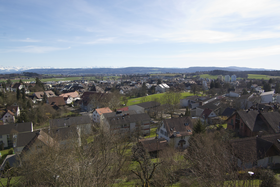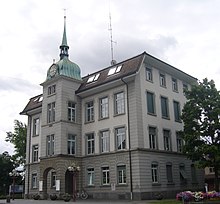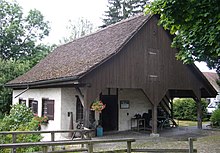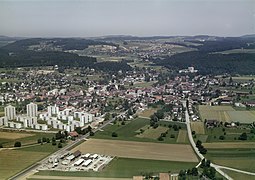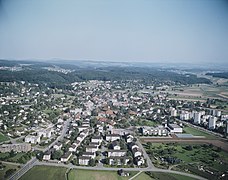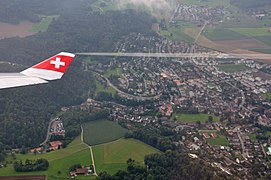Bassersdorf
| Bassersdorf | |
|---|---|
| State : |
|
| Canton : |
|
| District : | Bulach |
| BFS no. : | 0052 |
| Postal code : | 8303 |
| UN / LOCODE : | CH BSF |
| Coordinates : | 689 755 / 255407 |
| Height : | 460 m above sea level M. |
| Height range : | 442–556 m above sea level M. |
| Area : | 9.03 km² |
| Residents: | 11,687 (December 31, 2018) |
| Population density : | 1294 inhabitants per km² |
|
Proportion of foreigners : (residents without citizenship ) |
24.6% (December 31, 2018) |
| Mayor : | Doris Meier-Kobler ( FDP ) |
| Website: | www.bassersdorf.ch |
|
Bassersdorf |
|
| Location of the municipality | |
Bassersdorf (in the local dialect : [ ˈbɑsərʃˌtoːrfː ] or Bassi for short [ ˈbɑz̥i ]) is a municipality in the district of Bülach in the canton of Zurich in Switzerland .
coat of arms
- Divided diagonally five times by silver and blue and a red bar
The municipal coat of arms goes back to a family from Bassersdorf from the Middle Ages. Gerold Edlibach entered it in his book of arms around 1493. The number of bars in blue and silver varied over time. In the 18th century it also contained an imperial orb with a gold cross.
On June 5, 1930, the local council decided on the current form of representation.
geography
The place is located exactly between the cities of Zurich and Winterthur and therefore achieved modest prosperity during the Enlightenment as a transit village between Zurich and Winterthur. Today, a large part of the population works at the nearby Zurich Airport .
population
- Population density: 1,289.5 inh. / Km 2 (as of 2017)
- Number of private households: 4 896 (as of 2017)
- Denomination: 32.6% Protestant Reformed , 28.3% Roman Catholic , 39.1% other or no denominational affiliation (as of 2012)
| Population development | |
|---|---|
| year | Residents |
| 1634 | 310 |
| 1710 | 718 |
| 1836 | 825 |
| 1850 | 959 |
| 1900 | 1 092 |
| 1950 | 2 143 |
| 1970 | 5 590 |
| 2000 | 7 515 |
| 2007 | 10 470 |
| 2009 | 10 743 |
| 2010 | 11 052 |
| 2012 | 11 229 |
| 2017 | 11 593 |
politics
Bassersdorf is considered a rather conservative city with a corresponding bourgeois majority. In the 2015 National Council elections, the share of the vote in Bassersdorf was: SVP 32.9%, SP 17.3%, FDP 13.6%, glp 12.3%, Greens 9.0%, CVP 4.2%, EVP 3.4 %, EDU 2.7%, BDP 2.4%.
The mayor is Doris Meier ( FDP ) (as of 2017).
Partner municipality
economy

Bassersdorf's economy is geared towards the airport and airport-dependent sectors. Rotronic AG, which specializes in measurement technology, is also based in Bassersdorf .
traffic
Zurich , Zurich and Winterthur airports can be easily reached from Bassersdorf , either with one of the two S-Bahn lines (S7, S24) or via the road network. In 2013, Tempo 30 zones were introduced across the board in Bassersdorf .
history
In the area of today's municipality, walls of two Roman manors have been found, the foundation of which is dated to the 1st century AD due to ceramic remains: one in the village center on the occasion of renovation work on the Reformed church in 1963, the other in the 19th century. Century on a hill north of the village.
The name Bassersdorf points to Alemannic origins in the 8th to 9th centuries. In the traditional notes of Einsiedeln Abbey from the 10th to 14th centuries there is a short note that the monk Eberhard bequeathed his court to Basselstorff to the monastery . A corresponding certificate can no longer be found. But Bassersdorf is mentioned for the first time in a sealed deed of donation from Noble Gerung to the St. Martin monastery on the Zürichberg from November 15, 1155. In 1277 the Rüti monastery sold the mill in Bassersdorf to the St. Blasien monastery . The Habsburgs , then the Counts of Toggenburg , owned the rulership and the blood court. These were then transferred to Zurich, which had its rulership rights exercised by the Kyburg bailiff until 1798 . Then Bassersdorf, which did not make a lot of talk, stepped out of the namelessness for a moment: In 1798 Bassersdorf became the capital of a district, which soon became part of the Bülach district. Recall that Bassersdorf is now the seat of a notary's office.
Bassersdorf, located almost exactly in the geographical center of the canton of Zurich , has always been heavily affected by traffic from west to east and north to south (connections Winterthur - Zurich and Unterland - Oberland). After the construction of the new highway Zurich - Tagelswangen - Kemptthal - Winterthur , 1841 to 1845, craftsmen and landlords complained about major financial losses, as the carters now hardly ever took the old route via Bassersdorf and the arduous climb, which could usually only be tackled with a leader used more. The population fell, but the enticing prospect of a railway line raised new hopes. On October 6, 1872, the voters of Bassersdorf decided "with a majority bordering on unanimity" to invest 100,000 francs in the future Winterthur – Zofingen national railway line, "in the opinion that a station would be built in the immediate vicinity of the village" . Since 1877 this station stood in the heart of Bassersdorf. The village grew around the station, which was first served by the national railway , later by the federal railways. The station has been closed since spring 1980 and demolished since September 2012. In connection with the new airport line and the expansion to double lanes, a new station was built on the southern edge of the village. The railway no longer "cuts" the city. With the new railway line, life is now more and more towards Zurich and the airport.
- Structural development of the village since 1920
Baltenswil has also been part of Bassersdorf since 1931. This village has kept its rural character to this day. The Schatzacker settlement was founded in 1932 , based on the idea of free economy .
Crossair crash 2001
The first time that Bassersdorf was mentioned in the global media was when a Crossair plane crashed in the Bassersdorf area. The Crossair Flight 3597 was en route from Berlin Tegel Airport to Zurich Airport , when he opened the evening of November 24, 2001, landing on the forest floor and burst into flames. A total of 24 people died. The main reason for the crash was falling below the minimum descent altitude for the selected approach procedure despite insufficient visibility. Only the passengers in the front rows were killed in the crash, including the American pop singer Melanie Thornton and two of the three members of the pop group Passion Fruit .
Religions
In addition to the two large regional churches, the Evangelical Reformed parish of Bassersdorf-Nürensdorf and the Roman Catholic parish of Bassersdorf-Kloten-Nürensdorf , there are also free church parishes in Bassersdorf , such as the GvC Chile Basi (community of Christians). The Methodist Church Community in Bassersdorf built a chapel behind the post office in Bassersdorf in 1908 for their believers. After the sale, a consulting and styling studio was opened in the former Methodist chapel in 2003. At that time, the GvC was the tenant of the prayer room. In 2006 the GvC moved from the former Methodist chapel to the Freihof due to a lack of space.
Culture and media
Carnival
Bassersdorf has probably the largest and most important carnival in the Zurich Unterland . It is visited every year by a five-digit number of participants as well as guests and is an important cornerstone in cultural city life.
media
Since Bassersdorf is part of the Bülach district in the canton of Zurich, it is the official publication organ of the municipality of the Zurich Unterländer . There is also a regional publication called Dorf-Blitz , which is also published in the communities of Brütten and Nürensdorf .
Attractions
Personalities
- Karl Schmid (1907–1974) Germanist, teacher and professor for German language and literature, lived and died in Bassersdorf
- Elsie Attenhofer (1909–1999), cabaret artist, actress, writer and diseuse, lived and died in Bassersdorf (married to Karl Schmid from 1940)
- Rainer E. Gut (* 1932), bank manager, lives in Bassersdorf
literature
- Hermann Fietz: The art monuments of the canton of Zurich, Volume II: The districts of Bülach, Dielsdorf, Hinwil, Horgen and Meilen. (= Art Monuments of Switzerland. Volume 15). Edited by the Society for Swiss Art History GSK. Bern 1943. DNB 365803049 .
Web links
- Official website of the community of Bassersdorf
- Statistical data of the Bassersdorf community
- Martin Illi: Bassersdorf. In: Historical Lexicon of Switzerland .
Individual evidence
- ↑ Permanent and non-permanent resident population by year, canton, district, municipality, population type and gender (permanent resident population). In: bfs. admin.ch . Federal Statistical Office (FSO), August 31, 2019, accessed on December 22, 2019 .
- ↑ Data on the resident population by home, gender and age (community profile). Statistical Office of the Canton of Zurich, accessed on December 22, 2019 .
- ↑ Andres Kristol, Bassersdorf ZH (Bülach) in: Dictionnaire toponymique des communes suisses - Lexicon of Swiss community names - Dizionario toponomastico dei comuni svizzeri (DTS | LSG) , Center de dialectologie, Université de Neuchâtel, Verlag Huber, Frauenfeld / Stuttgart / Vienna 2005 , ISBN 3-7193-1308-5 and Éditions Payot, Lausanne 2005, ISBN 2-601-03336-3 , p. 126.
- ^ Statistical Office of the Canton of Zurich - database (community portraits) . accessed on January 14, 2014
- ↑ Elections 2019. Accessed August 1, 2020 .
- ↑ Overview of the Tempo 30 zones in the canton. In: zuonline.ch . January 17, 2017, accessed May 12, 2019 .
- ↑ Zürcher Denkmalpflege, 4th report 1964/65 , p. 17ff.
- ↑ With the demolition of the station, a three-year center construction begins ( Memento of the original from December 27, 2013 in the Internet Archive ) Info: The archive link was automatically inserted and not yet checked. Please check the original and archive link according to the instructions and then remove this notice. . Retrieved September 13, 2012
- ↑ The church remains in the village ( Memento of November 13, 2003 in the Internet Archive ) . In: Dorf-Blitz. Independent monthly newspaper for the communities of Bassersdorf, Brütten and Nürensdorf from March 28, 2003
- ↑ There is life again in the Freihof Hall ( memento of the original from July 9, 2007 in the Internet Archive ) Info: The archive link was inserted automatically and has not yet been checked. Please check the original and archive link according to the instructions and then remove this notice. (PDF; 72 kB) . In: Dorf-Blitz. Independent monthly newspaper for the communities of Bassersdorf, Brütten and Nürensdorf from June 2006

